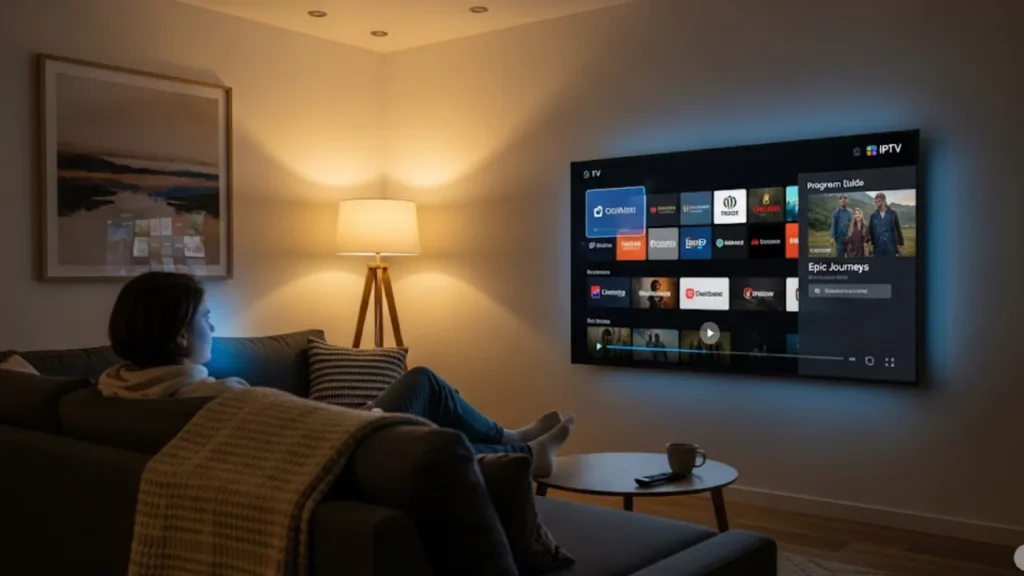The streaming world has changed a lot. Many Americans now wonder if their favorite IPTV services are legal. Understanding IPTV legality is important. There are many options and confusing rules. Knowing the law can help you avoid legal issues and security risks.
IPTV is legal in the USA if the provider has proper streaming licenses. Services like Hulu + Live TV, YouTube TV, Sling TV, and FuboTV follow copyright laws. They do this by using licenses. However, unlicensed IPTV platforms offering cheap premium channels are illegal. These services can cause legal problems under the Protecting Lawful Streaming Act. They may also put users at risk for malware, identity theft, and data breaches.
To stay out of legal issues and keep your personal info safe, pick IPTV providers that are licensed. They should explain their content rights clearly and provide good customer support. Illegal streaming may seem tempting, but it comes with real risks that aren’t worth it.
What Makes IPTV Services Legal?
Copyright Laws
Legitimate IPTV services work by obtaining streaming rights from content creators and distributors. This includes making deals and paying fees to networks, studios, and copyright owners. This helps them follow copyright laws. It protects both them and their users from legal problems. This approach supports creators financially and promotes a fair, sustainable content ecosystem.
The Digital Economy Act and similar laws say that streaming services need to prove they have valid content licenses. YouTube TV and Fubo TV have clear ties with content owners. They show this info to subscribers at local cable provider offices or online.
Licensing Requirements
Legitimate IPTV providers must get licenses for each channel, movie, and show they offer. This process involves:
- Negotiating with individual networks and content creators
- Paying substantial licensing fees based on subscriber numbers
- Maintaining detailed records of all streaming rights
- Regularly renewing agreements to avoid service interruptions
- Complying with geographic distribution restrictions
Regulatory Bodies Governing IPTV

The Federal Communications Commission (FCC) oversees IPTV and streaming services. It makes sure they follow copyright laws and keep consumers safe. Industry groups manage content licensing and spot illegal services. They create rules that protect both creators and consumers.
How Do You Identify Illegal Services?
Characteristics of Legal IPTV Services
Legal IPTV providers operate transparently with clear business models and comprehensive customer support. Services like Sling TV, Pluto TV, and Hulu + Live TV provide:
- Detailed subscription terms and pricing information
- Professional customer support through multiple channels
These providers partner with major networks. They offer a limited but real selection of channels instead of overly long lists. Their user experience focuses on reliability rather than overwhelming content volume.
Indicators of Illegal IPTV Services
Illegal services often make big promises. They claim to offer thousands of premium channels at very low prices. Warning signs include:
- Lack of transparent business information or customer support
- Promises of “lifetime access” to premium content
- Requests for payment through cryptocurrency or untraceable methods
- Massive library claims that seem too good to be true
- Poor streaming quality despite premium server claims
These illegal services often go by names like “IPTV Prime Hub” or “Guek HD IPTV.” They use misleading ads about premium and stable servers. However, they do not have the legal rights to stream content.
What Risks Come with Illegal IPTV?
Data Security Concerns
Illegal IPTV services come with serious privacy and security risks. These platforms often don’t use strong encryption. Users face higher risks of identity theft, data breaches, and unauthorized charges. Additionally, these services can spread malware, putting devices in danger. Illegal IPTV is risky for streaming. There’s no accountability or regulation.
Many illegal services ask users to install unauthorized apps on trusted streaming devices. This can compromise entire home networks. These providers have no real business operations. So, they don’t take responsibility for data breaches or security issues.
Legal Consequences and Prosecution
Unlawful streaming services will face tougher penalties under the Protecting Lawful Streaming Act. Customers who are discovered using illicit IPTV services could face:
- Civil lawsuits from content owners seeking damages
- Criminal prosecution for willful copyright infringement
Recent enforcement actions have aimed at large illegal services and individual subscribers. As a result, the risks for American consumers are becoming more real.
How to Identify Legal IPTV Services
Verified Providers
Stick with established legal IPTV providers that maintain transparent operations and proper licensing. Verified options include:
- YouTube TV – Comprehensive live TV with major networks
- Sling TV – Affordable packages with popular channels
- Hulu + Live TV – Combines live programming with on-demand library
- Fubo TV – Sports-focused service with extensive sports broadcasts
- Pluto TV – Free, ad-supported legal streaming option
These providers show their content licensing agreements clearly. They also provide professional customer support to help with subscriber concerns.
Importance of Research and Reviews
Before subscribing to an IPTV service, research the provider’s background and reputation. Check reviews from trusted sources. This helps you see user experiences. Look for common problems, like poor service, hidden fees, or bad customer support. Select services that clearly explain their content licensing. Focus on those that operate legally and prioritize transparency. A little research now can save you time, money, and frustration later.
Avoid providers that promise a lot of channels or offer premium content at low prices. Legitimate services balance content variety with sustainable business models.
Pro Tips for Safe IPTV Usage
Monitoring Compliance with US Laws
Keep informed about streaming rules and copyright laws for IPTV services. Check your provider’s terms and licensing status regularly. Choose services that show their legal and licensing details. If you’re unsure, go with trusted providers that have a strong track record. This helps you avoid unnecessary risks.
Engaging with Trustworthy Service Providers
When choosing an IPTV provider, prioritize strong customer support and transparency. Legitimate providers offer clear contact options like email, phone, or live chat. They also provide service agreements detailing pricing, terms, and features. Reliable providers have support teams that respond quickly. They resolve issues fast to ensure smooth viewing. Researching these factors can save you time and frustration.
Don’t use services that require a Virtual Private Network (VPN) to access content. This often means they break regional rules or stream without permission.
Final Thoughts and Next Steps
IPTV legality in the USA relies on proper content licensing and copyright rules. Legal options like YouTube TV and Sling TV provide safe streaming. But illegal services can lead to serious legal issues and security risks.
Select trusted legal IPTV providers. They should clearly show their licensing agreements and provide strong customer support. This method lets you enjoy streaming entertainment legally. It also keeps your personal information safe from security threats.
Frequently Asked Questions
1. Is IPTV legal in the USA?
Yes, IPTV is legal in the USA if the provider is licensed and authorized to stream the content they offer.
2. Is Firestick an OTT box?
Yes, the Amazon Firestick is an OTT device. It streams content over the internet, so you don’t need cable or satellite.
3. Is IPTV illegal if you use a VPN?
Using a VPN doesn’t make illegal IPTV legal. It only hides your activity—licensing is what determines legality.
4. What happens if you watch illegal IPTV?
Watching illegal IPTV can cause copyright problems. You might face fines or even legal action.
5. Is streaming IPTV legal for personal use?
Streaming IPTV is legal for personal use if the service is licensed and allowed to show that content.


